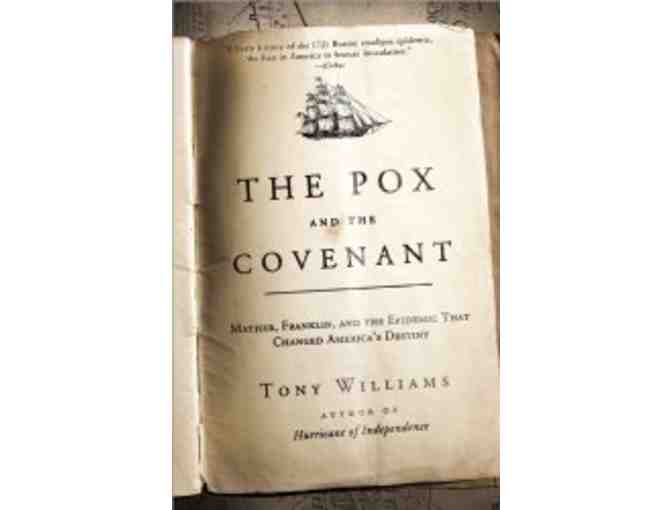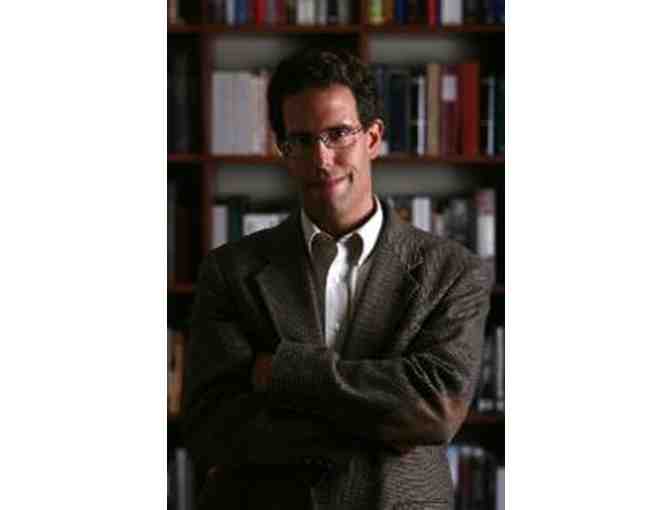Autographed Books
"The Pox and the Covenant: The Epidemic That Changed America's Destiny" Tony Williams!
- Item Number
- 122
- Estimated Value
- 50 USD
- Sold
- 30 USD to es80c2662
- Number of Bids
- 1 - Bid History
Item Description
Tony will personally autograph to you or your special one!
"Tony Williams is the author of five books including, "Washington & Hamilton: The Alliance that Created America," (Sourcebooks,2015), co-authored with Stephen F. Knott, author of "Alexander Hamilton and the Persistence of Myth."
"He has also written "America's Beginnings: The Dramatic Events that Shaped a Nation's Character,"(2011), "The Jamestown Experiment:The Remarkable Story of the Enterprising Colony and the Unexpected Results that Shaped America"(2011),"Pox and the Covenant: Franklin, Mather, and the Epidemic that Changed America's Destiny"(2010), and, "Hurricane of Independence: The Untold Story of the Deadly Storm at the Deciding Moment of the American Revolution(2008) "
"He can be reached for speaking engagements by contacting his publisher, Sourcebooks."
"Tony Williams tells a rollicking good story about the contagious crisis experienced by Colonial America. The Pox and the Covenant is a superbly nuanced and well-written account of the interactions of human disease and events." – Howard Markel, MD, PhD, George E. Wantz Distinguished Professor of the History of Medicine, the University of Michigan, author of When Germs Travel."
"After several days of skirting the North American coast, the Seahorse reached Boston, the largest city in the colonies, with a population of roughly eleven thousand souls. With such a large number of people, Boston rivaled the cities of mother England, save only for London. Boston was moreover one of the great hubs of the Atlantic trade network. It gathered goods from the farms of the New England hinterland and from smaller cities and ports along the American coast. These commodities were shipped all over the Atlantic while other goods were imported into the city and sent elsewhere. For a virus, a better place to contaminate could hardly be found....
A skeleton crew was left on the Seahorse while the rest of the crew and officers went ashore. At least one carried an infectious disease, one that would send a city into chaos, and put to its greatest test the covenant between the Puritans and their god."
– from The Pox and the Covenant
Praise for Tony Williams's Hurricane of Independence:
"Williams recovers the victims' speculation on the hurricane's meaning and its almost poetic commingling of the natural and moral worlds....An unusual and affecting take on the American colonies at the precipice." – Kirkus Reviews
"[This] double tale of natural disaster and epochal human events makes a good reading." – Booklist
From Amazon:
Well, I must say that this book surprised me. It takes an historic event and holds it up to show just how wrong established histories can be. Puritan pastors as vanguards of the new science? Who would have thought it? This whole event must have been an awakening for the young Ben Franklin, who later went on to be remembered as one of the greatest of America's early scientists.
What I found most fascinating was how the scientists of the day (as doctors were) rallied around a preconceived idea, and refused to budge from it, using personal invective to fight against anyone who challenged their consensus, rather than looking logically at the data - which in an instance would have destroyed their belief. In time the consensus was broken, and the truth won out, but the cost was so high!
This is a very interesting book, one that really takes your preconceived notions and runs them through the wringer. Want to read about a moment in history that will blow your mind? Read this book!"
Further, the story Williams told is very seldom heard. My tradition, Southern Baptist, neither vilifies nor sanctifies Puritans and the Mather family. Cotton and Increase Mather are recognized as important leaders in the early days of America. However, I never read of the importance Cotton played in the innoculation controversy. I never read of his deep faith and commitment to his calling. I am also surprised, and pleased, to see this great Pastor presented, for once, as a heroic figure.
Don't misunderstand: I do not come away with an idealistic picture of the Mathers. I DO come away with a greater appreciation of what life... and ministry... was like in 1721. I find myself wishing I could pop in for a visit and listen to this great minister pray for his people, but also very grateful that I live almost 300 years later. As it is, I am grateful that the public library kicked this little gem out of their control and that I bought my copy for 50 cents. It is far and away the best book bargain I have had this year."
Item Special Note
EDITORIAL REVIEWS:
"From Publishers Weekly
Historian Williams (Hurricane of Independence) explores a fascinating aside to American medical history—how a Puritan minister and one lone doctor... stood up to the medical establishment by carrying out the first-ever American inoculation program during Boston's 1721 smallpox epidemic. Here's the brilliant Puritan minister Cotton Mather, also a member of the prestigious British Royal Society, and Zabdiel Boylston, the doctor whom Mather persuaded to test out the theories of inoculation. The results were stunning. Out of 242 persons inoculated against smallpox, only six died. Despite this success, the public—including the young and brash Ben Franklin—loudly disapproved. If this account of the raucous, turbulent times is often stilted, the compelling details of the momentous experiment and the epidemic's devastating human toll speak for themselves. Williams argues that the campaign of Mather, the greatest preacher of his day, for inoculation illustrates the error of assuming that religion has always been an impediment to the progress of modern science and reason. But his better story is the one of Mather, a spiritual man and loving father who—despite being the target of an attempted assassin—wanted nothing more than to save his family and city.Map. (Apr.)
Copyright © Reed Business Information, a division of Reed Elsevier Inc. All rights reserved. --This text refers to an out of print or unavailable edition of this title.
From Booklist
In the midst of the deadly 1721 smallpox epidemic, two factions faced off in Boston over scientific innovation versus the Bible. A small but not inconsequential cadre believed that the previously unheard-of practice of inoculation would stem the spread of this serious disease. The larger community protested that the very notion of inoculation flew in the face of everything the Bible stood for. What’s more, they insisted, it was bad science. The surprising twist here, without spoilers, is that the latterly iconic Puritan minister Cotton Mather led the group putting its faith in science. The opposition numbered among it the most prominent and powerful physicians of the day, joined by several of Mather’s peers and community leaders and supported by members of the Boston press, including a teenaged Benjamin Franklin, who penned several scathing invectives criticizing Mather and his heretical proposal. Mather’s reputation took a beating, but Franklin did an about-face on inoculation within the decade. With present-day controversy over vaccination, everything old is new again. And Williams’ history is timely as well as engaging. --Donna Chavez --This text refers to an out of print or unavailable edition of this title.
Review
""A fascinating aside to American medical history."" - Publishers Weekly
"A lively history of the 1721 Boston smallpox epidemic, the first in America to feature inoculation." - Kirkus
"With present-day controversy
over vaccination, everything old is new again. And Williams' history is timely as well as engaging.
" - Booklist
"A welcome shade of gray into the traditional depiction of Puritans as repressive and closed-minded" - Boston Globe
""Williams does convey the point that these smallpox inoculations marked a good start toward better control over future epidemics. The book is well written and has an extensive bibliography, including primary and secondary sources, endnotes and index."" - Virginian-Pilot
"This slice of history showing religion and science working together to avert an uncontrollable catastrophe, is revelatory." - Sacramento Book Review
"The Pox and the Covenant does contain some vivid descriptions of plague-ridden New England and it is well organised and lucidly written." - The Lancet
""Williams excels at parsing out the individual experience of smallpox in the midst of crowded panic. Using diaries and other primary sources as jumping off points, he offers a richly imagined stage of grief, resilience, and resourcefulness."" - ForeWord
"A frightful look at the 1721 smallpox epidemic and clash between religious and medical leaders over inoculation." - American History
"The Pox and the Covenant is a well-written, informative read. Readers interested in colonial American history or the history of science more generally will find much to enjoy. It is also readable and approachable enough to make an excellent choice for upper-level high school or college history classes. It will serve as a launching place for those interested in exploring the nature of illness and medical science in the period, but also stands on its own as an engaging treatment of this chapter in American history."
"On September 6, 1620, the Puritans aboard the Mayflower departed on their religious errand into the American wilderness. They were Separatists who fled on their divinely ordained mission to escape persecution and establish a pure church free of the Catholic corruptions of the Anglican Church. As chronicler William Bradford wrote, in England, "religion has been disgraced, the godly aggrieved, afflicted, persecuted.... Sin has been countenanced, ignorance, profanity, and atheism have increased, and the papists have been encouraged." The Puritan church in the New World would recover its ancient biblical purity and be a model for the English Church; the Separatists could then return to their Mother Country.
The Mayflower sailed from Plymouth for the New World, Bradford wrote, with a "prosperous wind." The crowded vessel measured roughly one hundred feet in length and was rated at 180 tons. Her sister ship, theSpeedwell, had proved to be leaky beyond repair and had put in at Dartmouth to be mended. After a great deal of expense of lost time, the pair put to sea again but was forced back to Plymouth when the Speedwellsprang more leaks. The ship was clearly unequal to a transatlantic voyage, and some of her passengers boarded the Mayflower while others were forced to stay behind. Half of the provisions had been consumed in the weeks spent dealing with the Speedwell. It had been an inauspicious start to a voyage blessed by the Lord.
The Mayflower sped across the white-tipped waves once the voyage was under way, and the passengers were quickly afflicted with seasickness. The crew took great delight in the sufferings of the landlubbers and tormented them mercilessly. "There is an insolent and very profane young man," Bradford wrote, "who was always harassing the poor people in their sickness, and cursing them daily with grievous execrations." He even laughed that he hoped to "throw half of them overboard before they came to their journey's end." The Puritans believed that a just God punished the young sailor for his cruelty when, halfway through the voyage, "it pleased God...to smite the young man with a grievous disease, of which he died in a desperate manner." He was the first to be thrown overboard.
The favorable winds dissipated, and the Mayflower encountered a series of fierce storms and westerly gales that forced the crew to furl the sails and ride it out. They were "forced to hull for many days" and driven back. They surrendered to the will of God and prayed for deliverance to survive their arduous journey. One day a young indentured servant came on deck during a terrible storm and was thrown into the sea. He somehow grasped the rope that raised and lowered the topsail even as he was dragged several feet under the surface. He was frantically hauled onto the deck. The Puritans interpreted his rescue as an instance of God's providence rewarding them for their piety. Unlike many other transatlantic voyages, only one passenger died.
After a two-month trip during which they suffered the dreadful effects of that common seafaring disease scurvy, land was sighted on November 9. There were some disputes about where they would ultimately land because they tried to head southward for the Hudson River but encountered dangerous shoals and breakers that threatened to wreck the ship. The captain resolved on Cape Cod, but not before "discontented and mutinous speeches" were uttered by some of the "strangers" (passengers who were not Puritans) on board. The strangers were Englishmen who vowed that they were free men and would not submit to any authority over their lives.
Given these threatening circumstances to a people plunging into a vast and dangerous wilderness, the Puritans assembled and laid the foundation of their government in the New World. They wrote:
In the name of God, Amen. We whose names are underwritten, the loyal subjects of our dread sovereign lord, King James, by the grace of God, of Great Britain, France, and Ireland, King, Defender of the Faith, etc., having undertaken for the glory of God, and advancement of the Christian faith, and honor of our king and country, a voyage to plant the first colony in the northern parts of Virginia, do by these presents solemnly and mutually in the presence of God, and of one another, covenant and combine ourselves into a civil body politic, for our better ordering and preservation, and the furtherance of the ends aforesaid and by virtue hereof to enact, constitute, and frame, such just and equal laws, ordinances, acts, constitutions, and offices, from time to time, as shall be thought most meet and convenient for the general use of the Colony, unto which we promise all due submission and obedience. In witness thereof we have here underscribed our names as Cape Cod, 11th of November, in the year of the reign of our sovereign lord, King James of England, France, and Ireland the eighteenth, and of Scotland the fifty-fourth. A.D. 1620."
Constituting America stores data...
Your support matters, so Constituting America would like to use your information to keep in touch about things that may matter to you. If you choose to hear from Constituting America, we may contact you in the future about our ongoing efforts.
Your privacy is important to us, so Constituting America will keep your personal data secure and Constituting America will not use it for marketing communications which you have not agreed to receive. At any time, you may withdraw consent by emailing Privacy@frontstream.com or by contacting our Privacy Officer. Please see our Privacy Policy found here PrivacyPolicy.




